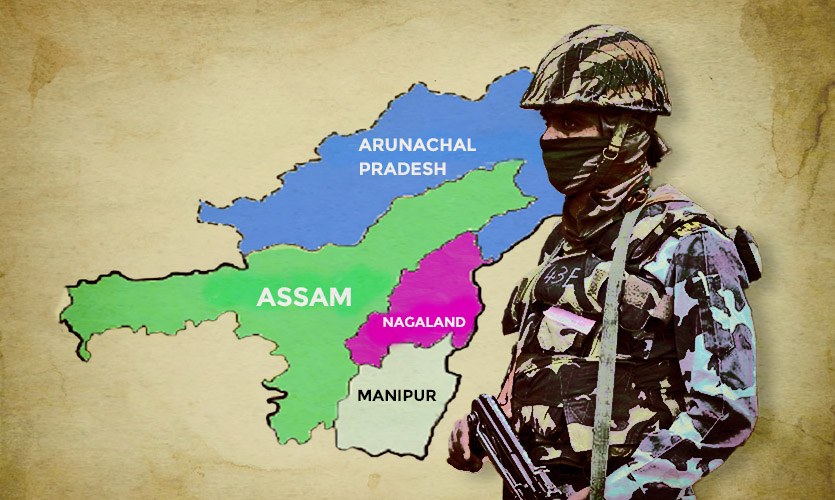The Armed Forces (Special Powers) Act (AFSPA) has been extended for another six months, in 12 districts of Nagaland and Arunachal Pradesh. It has been expanded in some areas of five more districts in the two northeastern states in order to help the military carry out anti-insurgency operations, and in some parts of Assam and Manipur.
According to government officials, the uncertainty surrounding the Naga peace process is one of the reasons why the AFSPA was retained in some parts of these four states.
Efforts to reduce “disturbed areas” have been made by the Ministry of Home Affairs (MHA) and the respective state governments in Assam, Manipur, and Nagaland, since April 1. Nagaland and Assam were covered by the AFSPA until April 30. The MHA and the state governments have concurrent powers to notify AFSPA areas under Section 3 of the Act.
In this Act, the armed forces are given unrestricted powers to arrest and search anyone without a warrant, or kill anyone acting against the law, protecting them from prosecution and legal suits even if the action has been taken without the permission of the government.
“In Assam, the AFSPA has been retained in areas that are adjacent to the Nagaland border. Assam’s Special Director General of Police GP Singh told the Hindu there is an ongoing peace process in Nagaland, and that once it concludes the special law areas will be reduced further.
Naga National Political Groups (NNPGs) have been invited by the Centre to participate in discussions on a resolution of the Naga political issue with the National Socialist Council of Nagaland (Isak-Muivah). In order to unite the 1.2 million Nagas, the Isak-Muivah faction, a key player in Naga peace talks, has been calling for a separate constitution and flag for the Nagas. The Naga-dominated areas in Assam, Manipur, and Arunachal Pradesh need to be integrated into the newly formed ‘Greater Nagaland’ or Nagalim.
A Nagaland police officer said that the AFSPA should be extended to the border areas of the three states in order to curtail underground movement. The state witnessed a surge in surrendered weapons and militants arrested after the AFSPA was first revoked from 60 percent of Assam, on April 1, 2020. 146 militants were arrested in 2020 and 216 in 2021, while 342 weapons were surrendered in each of those years. In the first nine months of this year, 131 militants have been arrested, and 83 weapons have been surrendered.
As violence had decreased and many militant groups had been killed, the special statutory power was removed. Assam’s Special DGP Singh said that the AFSPA was no longer needed as the presence of the armed forces had dwindled in the state even before the forces had been moved to the northern border in Ladakh to improve the situation there. “When there is no Army, what is the point of continuing the AFSPA? Police have enough provisions under Code of Criminal Procedure,” said Singh.
The only significant militant organisation that is still active, according to him, does not operate from Assamese territory; instead, it is the Paresh Baruah faction of the United Liberation Front of Assam (ULFA). Singh claimed that in the last five to six months, “the organisation has not been able to recruit any cadre”. It is rumoured that Paresh Baruah is in Myanmar.
Singh continued by saying that while extortion calls have decreased over the previous two years, the turnaround time for infrastructure projects has also improved. “Extortion ends when a region is free of insurgency, which immediately draws investment. The projects are being finished more quickly. They used to take longer in the past since they had to wait for police protection and a security ring before beginning the work,” continued the officer.
On September 15, Union Home Minister Amit Shah said that it was the government’s aim to resolve inter boundary disputes in the northeast and strike a conciliation with all armed insurgent groups in the region before 2024. On May 10, the minister said that the AFSPA would soon be removed from all areas in Assam.
In agreement with this, Manipur Chief Minister N Biren Singh has informed that 78 militants have reintegrated into society after the AFSPA was repealed from several areas of Manipur. According to him, a majority of the militant organisations in the state have agreements with the government and have suspended their operations.
15 police stations were relocated from the outskirts of the turmoil to six of Manipur’s 16 districts. Earlier in 2004, the municipal limits of Imphal were excluded from the AFSPA. In regions that either border Myanmar or Nagaland, the AFSPA is still in force.
In Arunachal Pradesh, Tirap, Changlang, and Longding districts, and the areas falling within the jurisdiction of Namsai and Mahadevpur police stations in Namsai district of the state, along the Assam border, are declared as ‘disturbed areas’.
Read more: Does The PFI Ban Give Grounds For A RSS Embargo In The Name Of Secularism?










